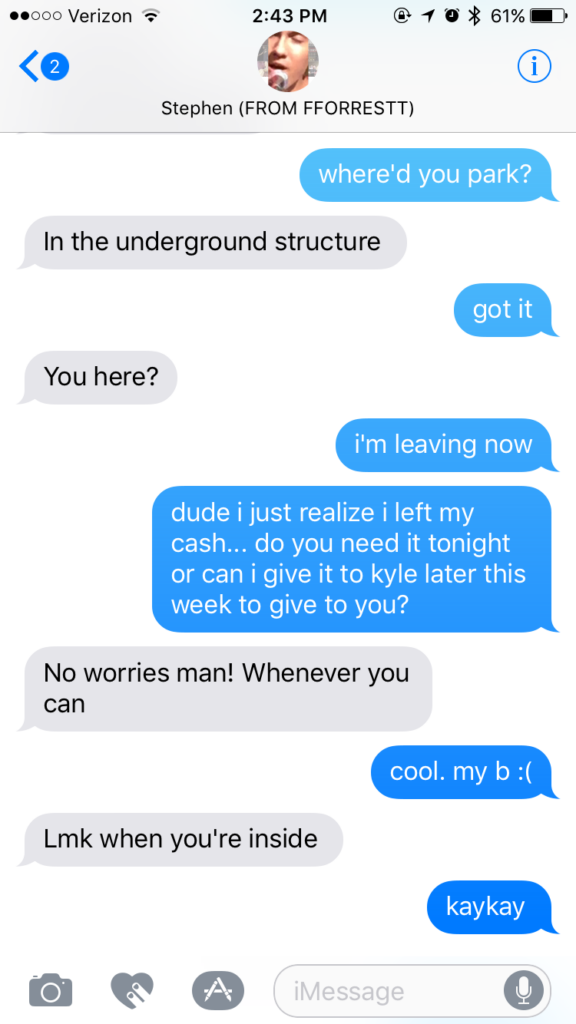The Impulse Problem
According to the Federal Communications Commission, “There were 3,179 people [in 2014 who were] killed and an estimated additional 431,000 people wounded in motor vehicle crashes involving distracted drivers. At any given daylight moment across America, approximately 660,000 drivers are using cell phones or manipulating electronic devices while driving, a number that has held steady since 2010,” and, “In 2014, there were 520 non-occupants killed in distraction-affected crashes.” We have all heard similar statistics before. After hearing them over and over we might even feel apathetic towards them. Of course they are devastating, but for me, an 18 year old, it seems as if that is just how it has always been and how it will always be. But this is not the case. Distracted driving, specifically texting and driving, must stop and it can stop. And ironically, the stopping starts with me.
 Just yesterday, as I was driving to the Anaheim House of Blues to watch one of my favorite bands, The Growlers, I texted while I was driving, and it was not even convenient! Here was the situation. My friend Stephen had bought my ticket to see The Growlers months in advance, but I kept forgetting to pay him back. I told him I would bring cash to the show to pay him then. But just after I had left my house, I turned onto the main street and realized I left Stephen’s money at my house. So my options were to text or call Stephen or to just go back to my house and get the money. Keep in mind, it would have literally only taken one minute to turn around and grab the cash. So, texting Stephen really was not the best option because, setting aside the risk of texting while driving for just one second, if Stephen were to respond when I got closer to the venue with something like, “I do need the money tonight, please go back and get it,” then it would have wasted extra time and gas that I spent to continue to drive farther from my house rather than to just turn around and get the cash. Even if I were to pull over and wait for a response, it still would have been faster to turn around and get the money. But instead, I texted Stephen and had to hope that he would tolerate receiving the payment later. Therefore, it would have been more convenient not to text Stephen but to drive home safely and get the cash.
Just yesterday, as I was driving to the Anaheim House of Blues to watch one of my favorite bands, The Growlers, I texted while I was driving, and it was not even convenient! Here was the situation. My friend Stephen had bought my ticket to see The Growlers months in advance, but I kept forgetting to pay him back. I told him I would bring cash to the show to pay him then. But just after I had left my house, I turned onto the main street and realized I left Stephen’s money at my house. So my options were to text or call Stephen or to just go back to my house and get the money. Keep in mind, it would have literally only taken one minute to turn around and grab the cash. So, texting Stephen really was not the best option because, setting aside the risk of texting while driving for just one second, if Stephen were to respond when I got closer to the venue with something like, “I do need the money tonight, please go back and get it,” then it would have wasted extra time and gas that I spent to continue to drive farther from my house rather than to just turn around and get the cash. Even if I were to pull over and wait for a response, it still would have been faster to turn around and get the money. But instead, I texted Stephen and had to hope that he would tolerate receiving the payment later. Therefore, it would have been more convenient not to text Stephen but to drive home safely and get the cash.
Furthermore, the risk of texting while driving did not nearly outweigh the importance of the text. As mentioned before, texting while driving is very dangerous. Hundreds of thousands of people are injured from distracted driving per year. The likelihood getting in a car crash yesterday was multiplied greatly when I picked up my phone. The risk was not worth the text. Also, I even have much personal experience from an accident caused by texting while driving. A little over a year ago, I was at a stop light and I picked up my phone to respond to a text. I thought the car in front of me had moved, so I pulled forward, but they did not move at all. I ended up rear ending the guy. Fortunately this texting while driving accident that I personally caused did not result in any physical injuries. But if it was a different situation, it could have been fatal. Also, I have been in another accident since then, which was not caused by distracted driving, so if I cause another accident I could lose my license. The text I sent, or any text I could have sent would not have been worth losing my license over, it would not have been worth harming myself, and it would not have been worth harming anyone else.
Given all of this information, there is no reason why I or anyone in my place would ever have texted while driving; so why do we? Well, in this certain circumstance, and this is usually the case, I was impulsive. I did not think it through. I acted upon what seemed to make sense in the moment; I did not seek any sort of perspective other than what immediately went through my mind. This concept of impulsiveness is not restricted only to texting while driving, but really to any decision that is made. Not everything has such dire consequences, but there are always consequences nonetheless. I was reminded of this during The Growlers concert when the lead singer, Brooks Nielson, sang the lyrics to their song “Feelin’ Good.” The lyrics go like this, “Just cause it feels good / Doesn’t mean it’s right / I know it sounds like it should / But that just isn’t life / Life has consequences / For all our actions / No one should suffer / Just for you satisfaction.” Brooks is completely right. Whether the subject is texting while driving or something less extreme, just because something seems pleasurable does not mean that it should be done. And it is especially evident with texting while driving that no one deserves to suffer just so that I, or anyone else, can satisfy an impulse. Thus, the root of this problem has begun to surface, and that is the human’s innate desire to fulfill their impulses.
Lastly, this is not the first time or the last time since then that I have texted while driving. Over the past two days I can remember three times that I texted while driving. Each of them all containing the same risk of injury and the loss of my license. It is often hard to stop texting while driving because the impulse is hard to contain. In the moment, drivers, including myself, do not always consider the risk versus the importance of the text. So the question, then, is how can people fight their impulse and take the time to consider the risk of texting while driving? I suggest that this action must not happen in the moment, but beforehand. Every time before someone gets into their car they must consciously choose not to text while driving. If this happens, the power of the in-the-moment impulse will exponentially decrease and we can begin to have victory over the temptation to text while driving. We can make this the last time we text and drive.
In conclusion, the risk I took to text while I was driving did not outweigh the importance or urgency of the text. It would have been even more convenient not to text Stephen, and I would have been safer had I not. Also, it is our innate desire to fulfill our impulses that causes us to text and drive. We need to think about the consequences, and this must be done before the key ever gets in the ignition, not in the moment when we are most susceptible to fall slave to our impulses. We must fight our impulses and stop texting and driving. And as I mentioned before, stopping starts with me. What I mean by this is that I personally have to make the difficult choice to stop texting while driving. And so do you. And so does everyone else. There is no magic spell that will cause everyone to suddenly stop texting and driving. It is a very difficult choice to follow through with but it is possible. Everyone must make a choice. And I am choosing to stop texting and driving.





